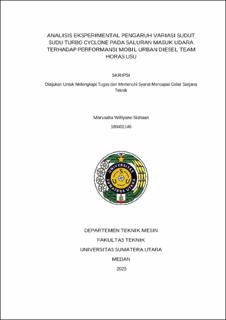Analisis Eksperimental Pengaruh Variasi Sudut Sudu Turbo Cyclone pada Saluran Masuk Udara terhadap Performansi Mobil Urban Diesel Team Horas USU
Experimental Analysis of the Effect of Turbo Cyclone Blade Angle Variations in Air Intake System on The Performance of The Urban Diesel Car Team Horas USU

Date
2025Author
Siahaan, Marusaha Willyano
Advisor(s)
Nur, Taufiq Bin
Metadata
Show full item recordAbstract
The scarcity of fuel oil has had a significant impact on many areas of human
life. The Horas Team has also conducted research by creating an energy-efficient car,
one of which focuses on the efficiency of the combustion engine, particularly in the
combustion chamber. The Turbo Cyclone is a component installed in the engine’s air
intake system with the aim of improving fuel efficiency by making the air spin within
the intake system. This research was conducted on a Yanmar L-40 engine used in the
Urban Team Horas USU car with a dyno test device. From the dyno test device,
parameters such as torque, power, air-fuel ratio (AFR), specific fuel consumption
(SFC), and thermal efficiency were obtained. The analyzed variations of the cyclone
blade angles were 30º, 45º, and 60º. The results showed that the Turbo Cyclone with
a 60º blade angle produced the highest torque at 1600 rpm, as well as the highest
power of 2.51 kW at 1600 rpm. The highest air-fuel ratio was found with a 60º blade
angle at 17.112 at 1600 rpm, as well as the lowest specific fuel consumption (SFC) at
174.15 g/kWh at 2800 rpm. The highest thermal efficiency was achieved at a 60º angle
at 3000 rpm, with a value of 58.73%. The Turbo Cyclone component can influence the
performance and fuel consumption of a diesel engine. The Turbo Cyclone with a 60º
blade angle is the most suitable variation to be used in the Urban Team Horas USU
car’s diesel engine compared to other variations
Collections
- Undergraduate Theses [1014]
